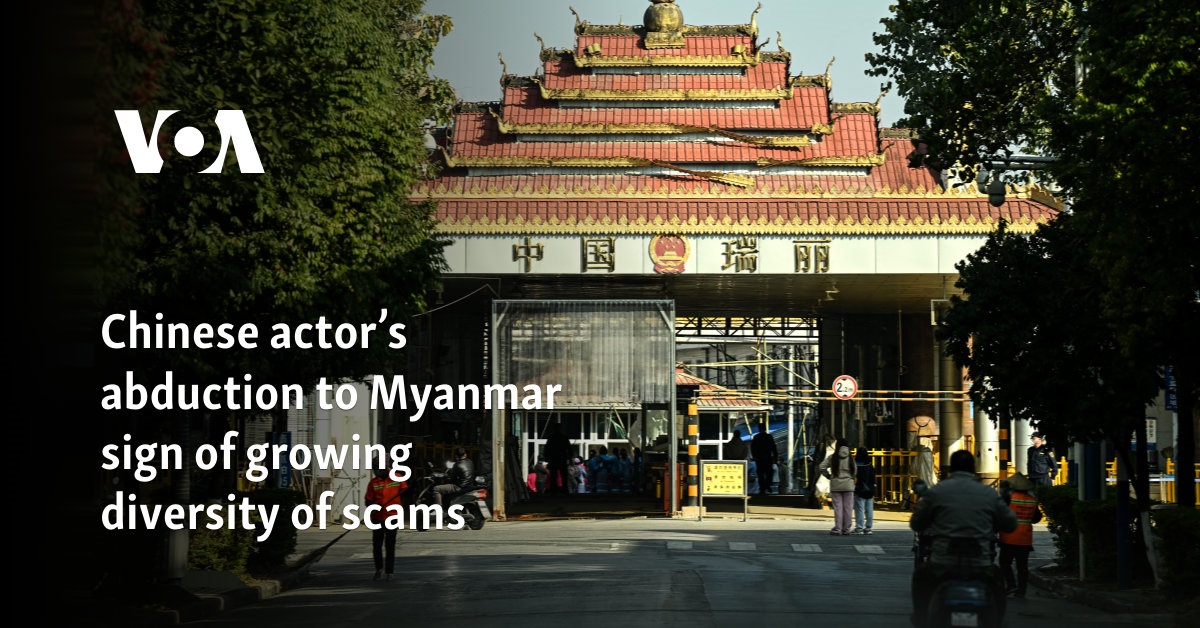
The recent kidnapping of a Chinese TV actor in Myanmar and his subsequent release is shedding new light on the lengths to which human traffickers running online scam centers in the war-torn country will go to lure potential victims.
Chinese actor Wang Xing went missing on January 3 in Mae Sot, a city in northern Thailand bordering Myanmar. His family reported him missing two days later, and with growing outcry on social media, the case prompted Thai and Chinese authorities to take action.
Last week, on January 7, Thai authorities say they found Wang in Myanmar and brought him back to Thailand.
Thai police said Wang was smuggled across the Thai-Myanmar border and was being held captive at KK Park in Myawaddy, which is notorious for its illegal scam operations.
According to local media reports, Wang was taken to Thailand under the false pretext of a film audition. He got the job offer through the social media platform WeChat. Wang flew to Bangkok and was flown to Myanmar.
Wang’s head was shaved. According to media reports, he was taken captive and forced to undergo training on how to conduct online scams. He said there were 50 other Chinese nationals in similar circumstances.
Following his rescue and return to Thailand, Wang, 31, flew to Shanghai on Friday.
Wang’s defense has inspired others to speak out and according to state media in China, families of about 174 individuals are circulating a joint letter on Chinese social media asking for help. According to the letter, family members say their loved ones are stranded in northern and eastern Myanmar.
Experts say Wang’s case highlights the increasing sophistication of the masterminds behind the scam operations.
“This is a very deliberate form of kidnapping, hostage-taking, that you see these scam syndicates running now. “The patterns of human trafficking in these complexes are rapidly changing,” Jason Tower, Myanmar country director at the United States Institute of Peace (USIP), told VOA.
He said, “This shows how these criminal actors are adapting and going to greater lengths to entrap people of a variety of demographics, either directly sucking money from them or using them for forced labour.” Can be involved in crime.”
At least one other Chinese national, 21-year-old Wu Jiaqi, was also rescued from Myanmar captivity in recent days, according to local media reports.
The targeting of Chinese citizens by criminal gangs in Southeast Asia has become a growing problem in recent years.
Chen, a Chinese national who declined to withhold his full name due to security concerns, saidradio free asia It was reported in 2023 that he was a victim of trafficking in a scam compound in Myanmar, and that at least 1,000 Chinese nationals were also trapped there, with the scam bosses demanding $30,000 per person for his release.
Experts say many illegal scam centers in Southeast Asia are linked to Chinese criminal networks operating in the region. Individuals around the world are lured by false business opportunities and forced to join scams.
A report in June by the United States Institute of Peace revealed that scam centers operating in countries across Southeast Asia, including Laos, Cambodia and Myanmar, have defrauded billions of dollars. These three countries share a border with Thailand.
“This is becoming a bigger and bigger problem. These Chinese criminal syndicates are deeply entrenched in all of Thailand’s neighboring countries, but they are also in Thailand,” Tower said.
Thailand’s Foreign Ministry spokesman Nikornadze Balankura said last week that tackling cross-border crimes is a national priority.
“Thailand has consistently stressed the importance of regular cooperation in promoting border peace and security and combating cross-border crimes, including illicit drug trafficking, human trafficking, cybercrime, telecommunications and online fraud. The Thai government attaches great importance to tackling cross-border crimes and considers it a national priority,” he told local media.
But Thai political scientist Thitinan Pongsudhirak told VOA that the fight against transnational crime needs more support from Thai law enforcement and authorities.
“Thailand is a whirlpool and nexus of scam centers and other international crimes. “This is a country with endemic corruption and dysfunctional institutions, especially the police force,” he said.
Scammers are a big problem for China and telecommunications fraud has been a frequent concern in recent years, with Beijing passing a telecommunications and online fraud law in December 2022.
Tower said Chinese authorities have stepped up public information campaigns and have even tried to use harsh tactics to prevent its citizens from traveling to Southeast Asia.
“In 2022, a story started emerging that going to Thailand could lead to trafficking in Myanmar and damage to your kidneys,” he said. “Later, you started seeing that when people booked tickets the police would call them and ask what they were doing in Southeast Asia.”
The Chinese-language film “No More Bets”, released in August 2023, depicts Chinese tourists visiting an unnamed Southeast Asian country, but are trafficked to a scam complex and forced into labor Is.
Benedict Hoffman, Deputy Representative for South-East Asia and the Pacific of the UN Office on Drugs and Crime, said that despite warnings, individuals are still being fooled.
“Despite huge efforts being made to raise awareness of the risks we are still seeing a lot of it – things like the movie “No More Bets” have really brought a lot of attention to it – which really shows That’s how effective these groups are in encouraging young people to go there, Hoffman said.
Chinese tourism in Thailand may also be affected. Chinese citizens are the largest visitors to Thailand, with more than 6 million arrivals in 2024.
But reports from Hong Kong said many tourists from China were canceling trips ahead of Lunar New Year celebrations starting on January 27.
Thailand’s Tourism Bureau attempted to reassure Chinese visitors by publishing a press release in Mandarin on January 10, stating that Thailand “attaches great importance to the safety of tourists.”
On Sunday, Thai and Chinese officials held a high-level meeting to discuss strengthening cooperation in combating transnational crime and human trafficking.
VOA contacted the Chinese Embassy in Bangkok for comment on the case and the growing concerns but did not receive a response.
Bangkok-based travel analyst Vincent Wichit-Vadakan said he did not think the recent cases would have a long-term impact on Thailand as a tourist destination.
“Hopefully these high-profile cases will inspire Thai and Chinese authorities to find more effective ways to prevent criminals from using Thailand as a hub for their activities,” he told VOA.






Leave a Reply